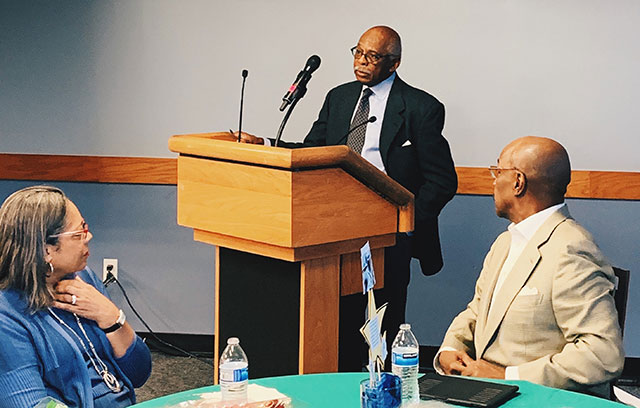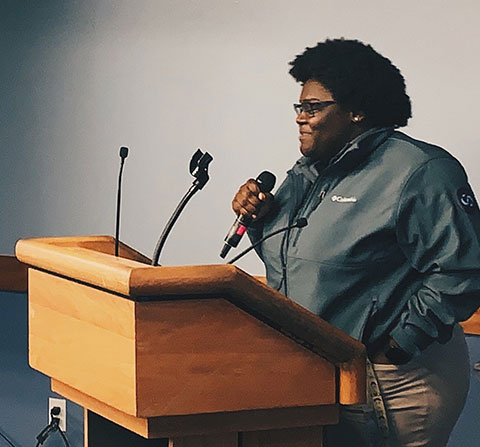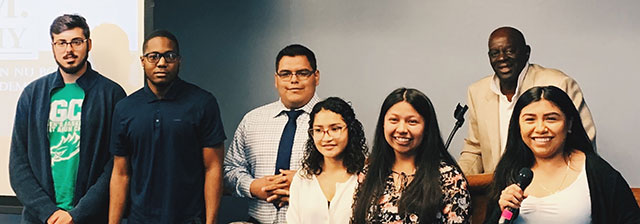Among the various summertime academics and athletics camps offered around Southwest Florida and here at Florida Gulf Coast University, there is a retreat for young people that offers many of those fun activities along with the educational aspects that an academics-themed summer camp at a university also would inevitably feature. But this camp offers something more — added value that gives it the kind of importance that transcends the tag of “camp” and earns the title “academy.”
At the annual FGCU STEM Academy, freshman, sophomore and junior high-school students — many of whom come from underserved and underrepresented backgrounds and aspire to be first-generation collegians — get an extended look and true taste of what their future can be like. The deadline to register for this year’s academy is March 31.
“It has transformed the lives of many kids in Lee and Collier counties,” said J. Webb Horton, assistant director of FGGU’s Office of Community Outreach. “Watching them come through our academy has been an amazing experience.”
Started in 2014, the STEM Academy — co-sponsored by Sigma Pi Phi Epsilon Nu Boule, the nation’s oldest African-American Greek-lettered organization — has helped almost 300 students drastically improve their math scores on the ACT, given them hands-on exposure to STEM (science, technology, engineering, math) majors and career paths, and been the catalyst for entrance to and scholarships from institutions of higher education. And considering the students also get to enjoy two weeks’ worth of FGCU’s first-class housing, dining and recreational facilities while visiting places such as NASA, the Museum of Science & Industry, the Conservancy of SWFL and Alico Family Golf, this is an academy where education meets opportunity and fun with transformative, life-changing potential.
Horton was addressing about 50 sponsors and partners of the program at a recent reception in the Cohen Student Union to thank them for their financial, professional and academic support. In telling the gathering that “he has learned it takes a village to raise a program,” Horton singled out one man in attendance he credits as the person who got this particular village started.
“We would not have this program if David Hinds didn’t come to us and ask what we (FGCU) were doing relative to STEM programs for minority students and others not exposed to STEM subjects,” Horton told the crowd. “He went out in the community, found people willing to put up money to back us, and that’s how this whole thing started.”

Hinds, a Naples resident, was managing director and partner for global cash management and trade finance when he retired from Deutsche Bank/Bankers Trust Company, New York, in 2000. When he first got together with Horton and Dr. Tony Barringer, FGCU associate provost/associate vice president for academic affairs, and Dr. Claude Villiers, associate professor in civil engineering, the foursome noted that other colleges and universities were doing similar STEM programs.
“But we wanted to do something transformational, not just copy what others were doing,” Hinds said. “That’s how we came up with the idea for students to live on campus for the duration of the camp.
“We could not have done this without the support of various organizations … the Boule fraternity came aboard from day one,” Hinds continued. “And the university has helped create a very special relationship with the community through this project. They open the laboratories up for us, and I thank each of the professors for the work they put in. We’ve also been able to provide students with additional help with writing and communication.”
Horton joined Hinds in thanking FGCU faculty members who volunteer their services to create and implement the STEM Academy curriculum, giving special thanks to Dr. Laura Frost, chemistry professor and director of the Whitaker Center for STEM Education, and math instructor Maggie Swanson for their work. And that work has paid off big time.
In before-and-after math testing of students, their ACT scores improved dramatically after going through STEM Academy instruction. In 2018, 96 percent of the 40 participating students improved their raw ACT score, and 88 percent bettered their scaled score, which is used for college admission. Last summer, math-score improvements were recorded by 86 percent (raw) and 77 percent (scaled) of students.
But those impressive numbers only tell part of the story.
There to tell the supportive gathering the rest of the story was a diverse mix of STEM Academy graduates themselves. One of them, 2019 FGCU biology graduate and future Ph.D. candidate Alex Amador, said the academy “100 percent” steered him toward a career in his science major.
“It was just an awesome experience,” said Amador, a Golden Gate High School graduate who attended the inaugural camp as a student in 2014 and returned as a counselor in 2017, joining many other FGCU students who help university staff manage the academy. “When I came here and saw the beautiful campus, the awesome facilities, all the opportunities … all I wanted to do was attend FGCU after being here for two weeks.
“It can be difficult waking up early in the morning for a couple of math classes during the summer, but in the end, it’s a lot of fun and really worth it,” Amador said.

Another “superstar graduate” of the program, as Horton called her, is Regine Cooper, a Dunbar High alum who parlayed some of the skills she learned at that inaugural 2014 STEM Academy into a scholarship at Colgate University in New York, where she also participated in track and field while earning a degree in political science. Today, Cooper works as a project manager for Suffolk Construction in Estero, where she’s a part of the team building the new Gateway High School in south Fort Myers.
“When I entered the STEM program, I wasn’t going to college, but planning to enlist in the Air Force,” Cooper told the crowd. “Once I saw the professional panel that spoke to us at the STEM Academy – people of color who are doctors, lawyers, owners of their own businesses — I just became amazed by all the things I could become. I really did have an epiphany here. This program introduced me to some of the most important people in my life. I had never thought I could aspire to be like the people I thought were better than me. It really is an amazing, life-changing program.”

ABOUT THE FGCU STEM ACADEMY
Goal: To improve students’ future outlook by exposing them to opportunities in STEM careers and improving math skills
Specifics: A 12-day, overnight academy hosted on the FGCU campus
Highlights: Extensive math training with ACT pre- and post-testing, professional communication sessions, faculty-led STEM sessions, off-campus field trips
Funding: Made possible through the sponsorship of FGCU and contributions of community members and partners. To learn how you can support the program, contact J. Webb Horton at 239-590-1335 or [email protected].
Years: 2014-present
Total students through 2019: 271
Black or Hispanic students: 82.3 percent
Gender: 56 percent female, 44 percent male
Class breakdown: 9th grade (31 percent), 10th grade (32 percent), 11th grade (37 percent)
Average high school GPA: 3.7
2020 Academy: June 14-26
Application deadline: March 31; apply online
Information: [email protected] or 239-590-1258[/vc_column_text]